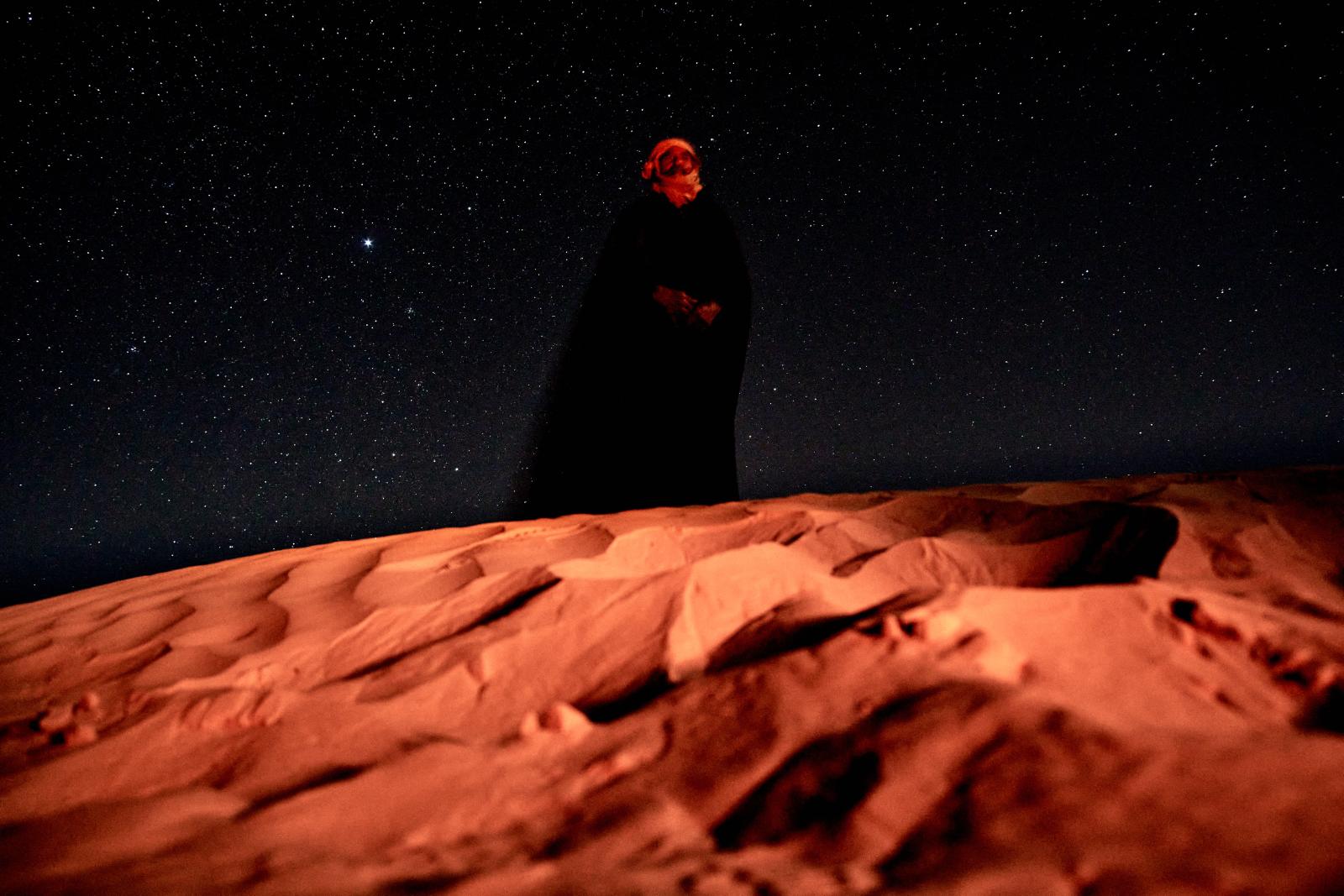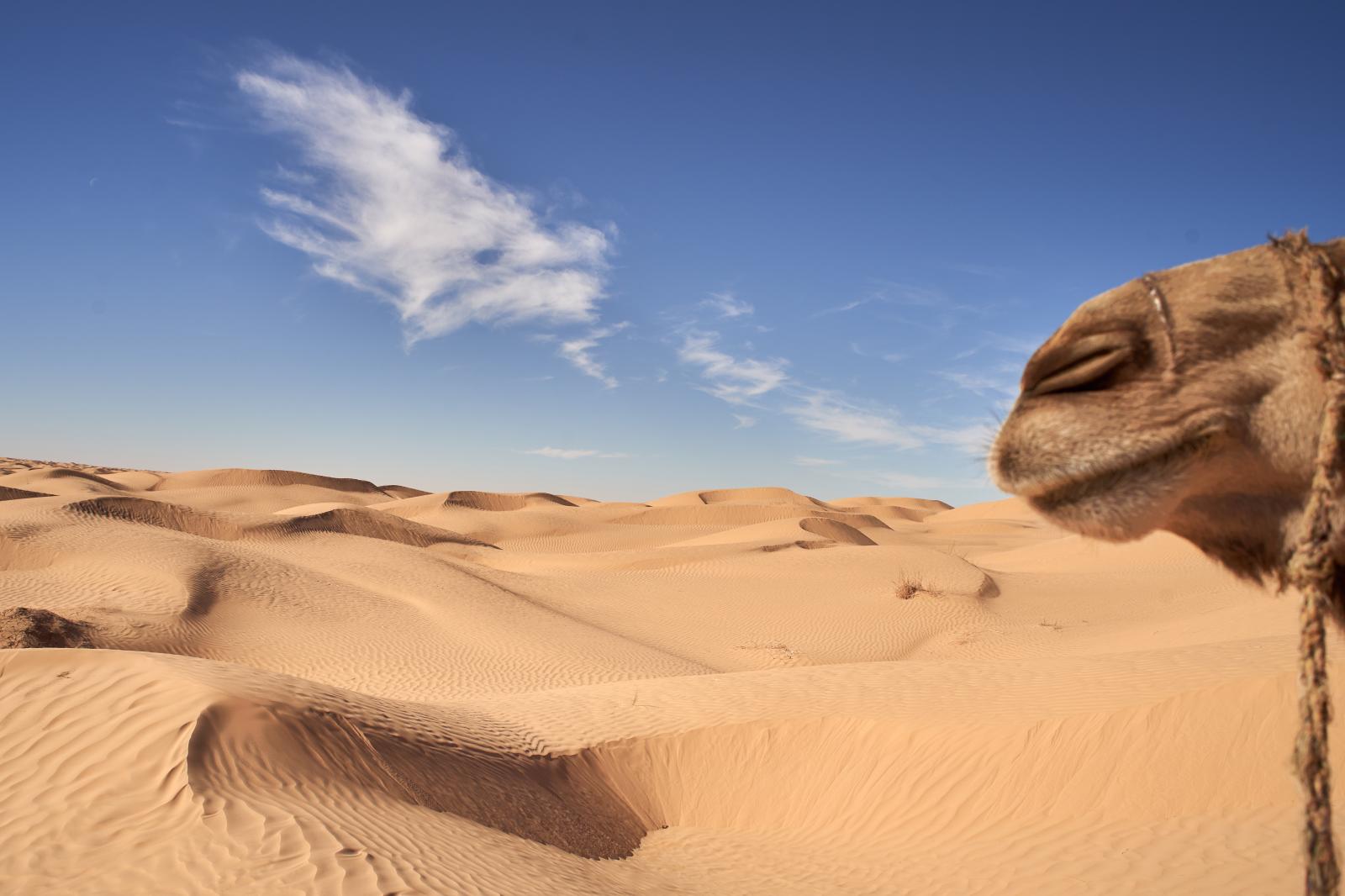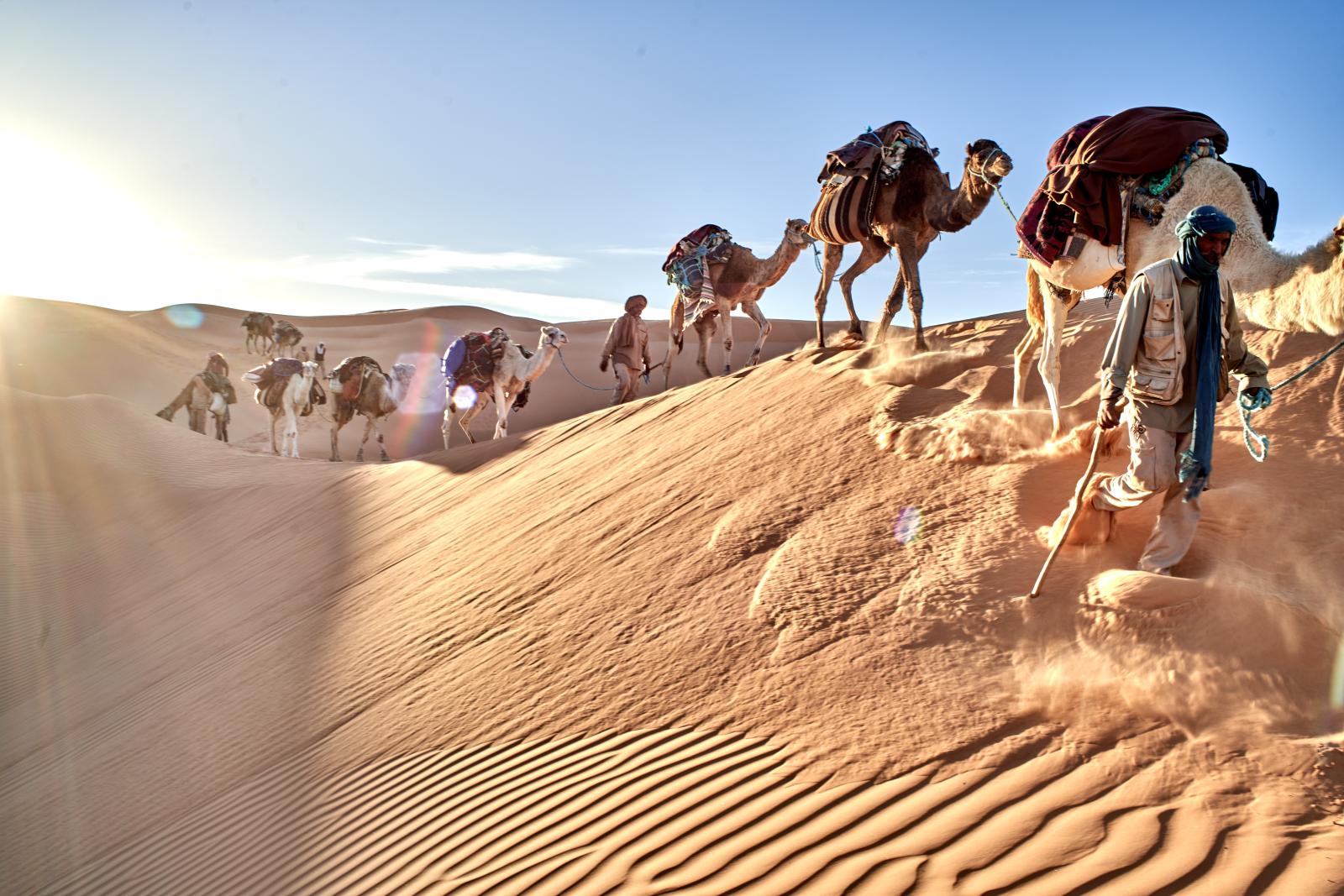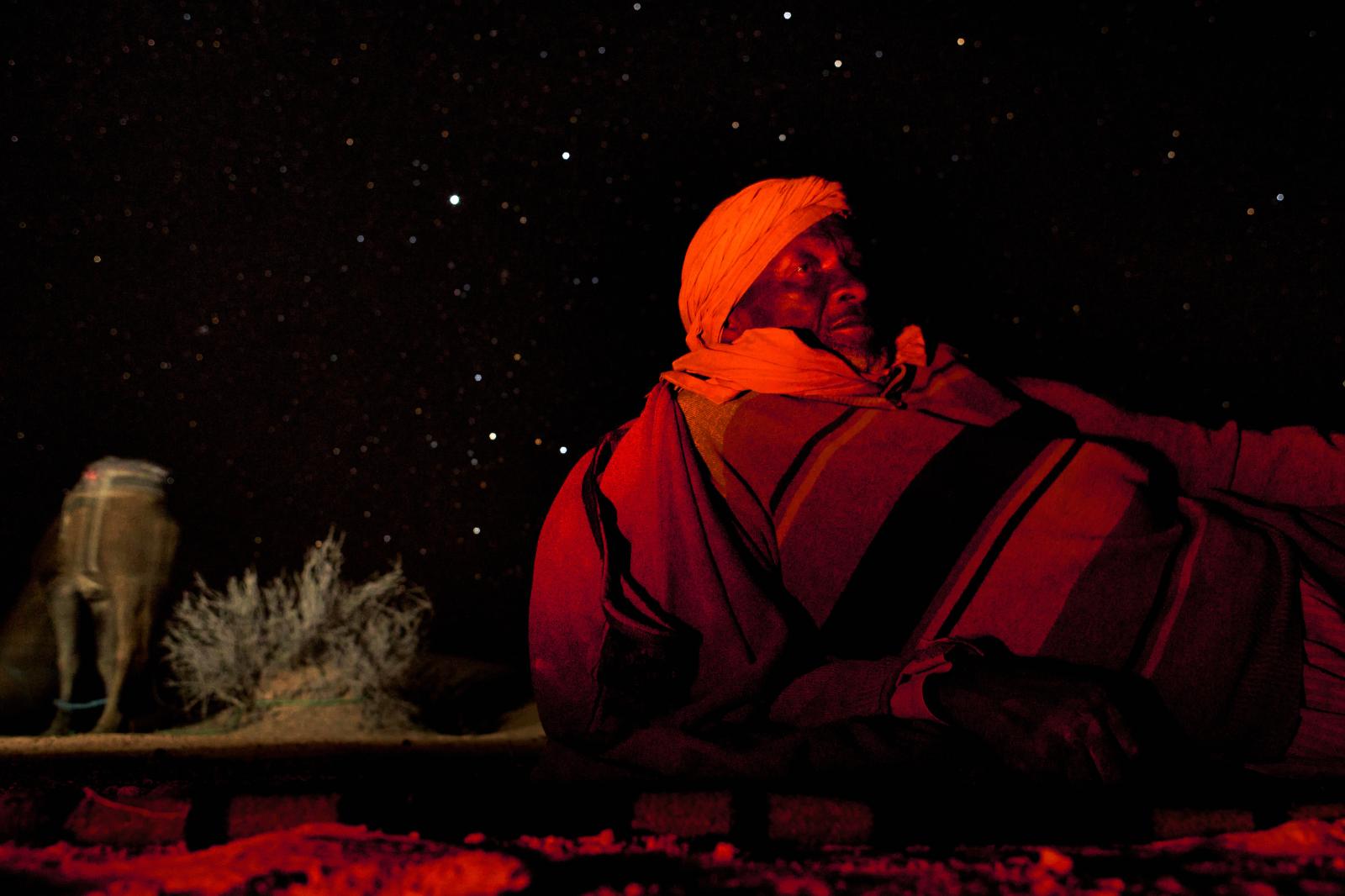Public Story
No GPS in the desert
Summary
A travel story, interviewing the last of a generation of cameleers as we walked for two weeks through the desert of southern Tunisia.
Written by the anthropologist Jamie Furniss, Photographed by David Degner
Written by the anthropologist Jamie Furniss, Photographed by David Degner
Photos by David Degner
‘Can you take a picture of me here, with the two mountains in the background?’ Ali asks, as we crest a dune. ‘The sight brings back so many memories. I used to watch over sheep here when I was young. I spent so much time here.’
In the first photo, he stands propped against his Asa, a waist-high camel stick, cut from a desert shrub, with a crook bent into one end of it by heating it in the fire. Barefoot in sand as fine and powdery as talc, he holds Karbouli, one of the camels, by the halter in one hand, and his sandals in the other. The next two photos are truer to his personality: he has swapped the serious expression for a broad smile, a couple yellowed teeth shining out broadly from beneath his moustache as he strikes a playful pose and points at the mountains in the distance. His face is gaunt, cheeks deeply weathered, whiskers graying, and many of his teeth are missing, yet he gives off a sort of coltish energy.
Introduced to the clients on this 15-day trek through the southern Tunisia desert as ‘Ali GPS’ because of his renown as a navigator, Ali Ben Ghannem is a cameleer and guide. Or, as he puts it, correcting me when I refer to his profession as guiding, an ‘expert’ of the desert. Perhaps the nickname was given to him to reassure us. On the first day of the trip I asked, ‘Could you show us on a map where we’ll be going?’
‘We don’t carry maps,’ Mounir replied.
‘I see. And what about a GPS?’
‘Nope.’
Perhaps sensing a tinge of unease, he added ‘But don’t worry, we don’t need one, we have Ali. Come over here, I’ll draw you a little map in the sand.’ He then plotted a kind of abstract map consisting of straight lines and curves representing directions of travel day by day, arranged around three landmarks we had to hit if the camels were to make it 15 days: two wells and a natural spring.
Among themselves, the guides more often call GPS Ali Bishwisha, a nickname that—a testament to the importance they attach to lineage—was first given to his grandfather, and has been passed down three generations. They share responsibilities with such humility and horizontality that I struggled over the course of the trip to figure out who exactly was the ‘group leader.’ After alternately thinking about half of the guides played this role, I ultimately realized the title was impossible to bestow since it misdescribed the way the group worked; and yet, something did set Bishwisha apart.
Our trip began with an imposing party that, including all members of the two species that composed it, numbered 38: 20 camels, and 18 guides and clients, in equal number. This 1:1 ratio seemed high to me, but as each guide comes with his own camels, and it is rare for one man to have the money to own more than two or three, you need to employ about 10 guides to get 20 animals on the trip. Besides, the tour company aspires to provide as much employment as possible in this economically disadvantaged area, and it lightens the workload.
On the client side, we are a mix of North Americans and Germans, with two Ukrainians and a South African, five women and four men. Fifteen days is a long time to spend walking the desert, at least nowadays, so five days into the trip, on New Year’s day, four of our friends made their way back into the world of mobile phones, paved roads, and airports thanks to some Toyota Land Cruiser 105’s with which we rendezvoused. Three of the guides and several of the camels also left us here, beginning several days walk back to Douz, the nearest town. For the next ten days we saw other people only once, at Weedhat Al-Rashed, a natural hotsprings that a few Germans, French and Tunisians had driven their 4x4’s two days through the dunes to visit. A few locals have permission from the tribe that is responsible for the area to run cafés there. As we walked out of the dunes into this bizarre scene, a couple Europeans whipped out their mobile phones and began snapping photos of us. A momentary insight, I thought, into what it fees like to be on the other side of the shutter for once. A hot bath in the springs under the stars was glorious, but we were glad to slip away into the dunes again the next morning.
All of the guides are from around the southern Tunisian city of Douz. Most grew up as nomads—that is, living year around in tents their families moved seasonally, to follow rainfall and ensure good grazing for the sheep, goats, and camels that were their only livelihood. All are men, and all but one are also fathers, of between four and eight children. They are not quite as young as they are youthful: two are in their forties, three in their fifties, three in their sixties, and one in his seventies. If they were Marvel characters each would have his own superpower, so to speak: the musician and dancer, the chef, the one who makes the desert bread, the navigator, the saddle-maker, the translator. As members of the Adhara tribe and often close relatives, all except one also have an “in” through kinship. Only Bishwisha, who comes from another tribe and a distant village, owes his presence and status solely to the others’ estimation of his accomplishments and charisma.
After stints herding animals, making charcoal from wood collected in the desert, and smuggling tea across the Algerian border, “some tour operators contacted me because they wanted to take people to places no one knew in the desert,” he explains. “So I began working for them as an expert.” At 66, he was born the year Tunisia gained independence from France, and lived under a tent until he was almost thirty. Only when he had his first child, and decided the boy should go to school, did he settle in the village. Among the many tales of his storied past, one of the first legends we are told is that he once spent two years entirely alone in the desert. Bishwisha is perhaps the least inhibited of the guides, who are modest-bordering-on-bashful, but this remains one of those stories that is more often told about a person than by them. Accordingly, I first heard it from Mounir.
‘How do you come spend two years alone in the desert?’ I asked Mounir, after he first made the claim.
‘It was a period when there was little rain, and the grazing was bad. Many animals died,’ Mounir explained. ‘To keep his heard alive, he drove the animals deeper and deeper into the desert, always managing to find a little more grazing.’ After a pause, Mounir adds: ‘And there is also a saying, “A good nomad never follows in someone else’s steps.” He was able to save almost the whole herd, and to spare his family great hardship. He returned a hero after those years.’
Twilight comes early and suddenly in January, and we are trekking through the period of the new moon, which we are told left only three months to go before Ramadan. The nights are cold enough to leave frost on the blankets and evenings are spent huddled around the fire, resting against saddles and bags arranged in a semi-circle to block the wind. Sometimes, after dinner, Messaoud would pull out a Gazbaya and two Bandeer’s, and a session of music and poetry recitation would begin. There hardly exist simpler instruments. The Gazbaya is an end-blown flute like the Nayy: basically, a hollow cylinder, a reed, or simply a piece of aluminium pipe bought at the hardware store, with some holes drilled in it. The Bandeer is a drum made of a circular piece of wood with a goat-skin stretched over it, and sometimes a snare underneath the skin, to give it a kind of droning or buzzing quality. Messaoud is the team’s McGyver: the guy who can get you out of any bind with just a swiss army knife. Always mending or tinkering with things, he made most of the camel saddles. He is also the maker of the musical instruments, and a delicate musician. When we asked him what the most important items are when travelling in the desert he answered ‘a knife, matches, and an awl for mending saddles, bags and shoes.’ But his most prized possession was ‘a flute I made for my father, then inherited again when he passed away. I only play it on the most special occasions, it is so precious to me’
In the course of these evenings, Bishwisha often recited some of his poems, his voice pulsating rhythmically, echoing off the Bandeer held up in front of him, a few haunting notes being played on the Gazbaya in the background by Messaoud or another guide. The poems speak of—what else—love, as well as travel in the desert. Impossible for me to understand despite a long and not entirely unfruitful apprenticeship to the Arabic language, I made some recordings that I later asked a native speaker of Arabic from the north of the country to transcribe into English. After some time, she wrote back ‘I think I need Arabic courses! This is Bedouin sensual poetry, the language used is uncommon and contains many metaphors.’ She eventually gave up on translating it, and instead produced an annotated transcription of the Arabic original. One of the poems is a flirtation in which a man and woman speak to each other in alternating stanzas, using sensuous descriptions of foodstuffs—milk and bread dough, for example—to allude to their intimate desires. The woman beseeches the dog that guards her family’s tent not to bark when the man draws near, presumably so his night time visit will remain secret. The poem ends with the woman exhorting the man to ‘stop being shy, I’m not getting any younger here’ and him saying that ‘she is young and prudent, and behaves like she is dead [in front of others], but her eyes burn!’ Many of the poems are laments, and their lines arouse cries of “wok, wok, wok!” from the other guides, the way people snap their fingers at a poetry slam. An exclamation of pain in the southern Arabic, the interjections of “wok” acknowledge the poetry’s strength and the poet’s pain. One such lament, and the poem that received the most encores on the trip, was composed (none of his poetry is written down: he cannot read and write) on the top of a dune the night his first love got married, to someone other than him.
A few days into the trip, we had a ‘get to know each other’ evening where we asked each of the guides a question, and invited them to do the same in return. It was fun, but our questions’ many presuppositions and the ceremoniousness of the context seemed to leave us playing roles. When we asked one guide ‘Can you tell us a time about when you were afraid in the desert,’ he shot back: ‘I can’t say I ever remember having been scared in the desert, but there certainly were a few times when I scared other people!’ A response that met with a round of hearty laughter from the others. I tried to insist, futilely, before retreating to a different topic. Did the encumbrances of masculinity or the need to preserve prestige make an admission of fear impossible in front of the others? Or was the question too thoroughly a reflection of an outside perception of the desert? Simply unrelatable, as bizarre as the question ‘can you tell a story of a time you got scared going to the post office?’ might be to us?
Later, Salem, the oldest guide on the trip, made an unsollicited admission of fear, in response to a completely different question.
‘Salem, have you ever been to the sea?’
‘Yes, in Gabés,’ he replied.
‘How did you feel when you saw the water?’ I persisted.
‘What can I say, my brother. Endless blue waves. We spent the night, it was a beautiful place to sleep, it was so calm, and unusual.’
‘Did you swim?’
He laughed. ‘I swam a little bit. I swam out until the water came up to my knees.’ Seeing we did not really regard this as much of a swim, he continued ‘What? Did you expect I would swim all the way out to the boats? I was scared!’
The night after the photo at the mountains, I sat next to Ali while dinner was being prepared. I wanted to ask him more about himself, and my hope was that if we were apart from the group I could avoid making him feel self-conscious or thinking he has to put on a show. Not quite believing the story of the two years alone in the desert, I said ‘Tell me, did you really see no one for two years?’
‘I did see a few people for, a day or two, on a few occasions’ he said. ‘Other than that, only God was with me.’
‘Didn’t you have to come out of the desert to buy things like sugar and flour?’ I interrupted.
‘No, no! The few times I saw people, I asked them to bring some with me. So I had flour and sugar, but mostly I ate rabbits and gazelles I hunted. When I had meat, I wouldn’t eat the flour, so I could save it for later.’
Perhaps sensing that my doubts about the story were underpinned by a degree of bewilderment at its motive, he continued, offering ‘My life is the desert. I dislike going to the city, I dislike problems. My life is the desert. I loved living in the desert, I wish I could do it all the time. In the desert you go to bed tired, and wake up rested. In the city, it’s exactly the other way around.’
Amusing enough on its own, what made the witticism about the citry really striking was that what Bishwisha was referring to as ‘the city’ were villages like Sabria or the regional market-town of Douz: what to most people’s minds are the most peripheral toehold of human settlement imaginable, the Timbuktu of Tunisia, so to speak.
‘But when I turned 22 years old, I went back to the village,’ he continued.
‘To Sabria?’
‘Yes, to Sabria. I wanted to meet someone, you know, to get married. And I did. I married a woman, the woman I live with now.’
‘How did you meet?’
“I met her…” he said, his voice trailing off, before finishing the sentence this way: ‘We met because she loves deserts, she loves animals, Niag [female camels], Jmal [male camels], sheep, and the desert. She loves the desert. She told me that she too wanted to live in the desert.’ To him, that seemed to be explanation enough.
‘We spent about five years getting to know each other without being married. When I turned 27 I said: “let's get married.” So we did. We got married and started living together and going out into the desert. We spent most of our time out in the desert until we had children. When we had our first son, I wanted him to be educated. I wanted him to go to school, rather than live like me in the desert. I said to myself that school was better than the desert.’
Like the story of how he and his wife met, he left it to me to imagine why he wanted a different life for his children, and what he thought of the decision today, and instead continued with great serenity to explain that:
‘As they grew up, my children began to make their own decisions. I would say to them “why don’t we go out into the desert” and they would say “the desert? What are we going to do out there?”’
This is something we heard often from the guides, none of whom had much luck convincing their children to work in the desert. One guide’s son had married a foreign tourist and now lived in Germany, a few others found positions in the military after finishing their mandatory service, but most were un- or under-employed, with little desire to remain in Tunisia, and little hope of leaving it: ‘unclear purpose of visit,’ ‘insufficient evidence of financial means,’ ‘suspicion you may not return to your home country’ are about the only phrases they will ever hear back from a European or North American embassy to which they apply for a visa.
Changing the subject, I asked: ‘The place where you got me to take your photo with the two mountains, Al-Dakanees al-Kabeer. You were telling me about how you have many memories of living there when you were younger. When you see it today, how is it different from the way the you remember it growing up?’
‘There are many differences...’ he began, voice trailing off into silence for a few moments, as in response to so many of my questions. But this time he elaborated. ‘First of all, there are no more gazelles. No more gazelles, that is the first difference. Before, there were many gazelles. That is how it gets its name, the “Big Dakanees”: Dakanees are a type of gazelle. The second thing is the trees and vegetation. In the old days the whole area was green, it used to rain. The third thing is that there were people all the time. You would see animals and nomads and camels and shepherds. Whenever I came, I always saw fire, and people. Now there is nothing. Not just there, but during the whole trip: we came from Douz all the way to here without seeing a single person.’
The desolateness makes it hard to believe, but the landscape is crisscrossed and thickly layered with stories, memories, marks of human passage, and change. A discarded plastic bottle, a cable and sensor emerging from beneath a dune, or a set of vehicle tracks in the hard earth give the impression of a place that was long empty and inaccessible being slowly trespassed upon and vanquished. You have a lot of time alone with your thoughts on a trip like this one, and I sometimes pondered whether our choice to travel by camel, or our attentiveness to things like packing out all our waste (and whenever possible others had left behind too) differentiated us sufficiently from the ‘others’.
What is less apparent on the surface of the sand is that if the desert is being filled up—with things 4x4 tracks, garbage, roads and oil wells—it is also, simultaneously, being emptied out. Some of the other traces layered into the landscape attest to these deeper temporalities of change: arrowheads exquisitely chipped from stone, or fragments of broken ostrich eggs. Remnants of hunters so ancient they did not possess metal, and of a time when this was gentler, more humid habitat for birds.
‘When I was young, there was so much more rain,’ Salem told us, when we asked if he had an especially fond memory of growing up. ‘It made people much happier than they are now. I think people in Europe and north America do not really like the rain. But in the desert we like the rain and we miss it a lot already.’
Hearing this comment, Messaoud agreed, adding ‘When I was a boy, we camped in this exact spot with 250 animals for a whole month. Today, there is hardly enough grazing to stay here for a week with the 20 camels we have along.’
With less rain, there is little grazing for the herds and few animals to hunt. And besides, under the influence of increasingly globalized media and advertising, young people’s aspirations have been progressively re-oriented toward new horizons. Since the 1980s no one really lives nomadically anymore in Tunisia, except perhaps a few members of the Riba’i tribe: Algerians living in Tunisia, who have managed to occupy a kind of interstitial space in which no bureaucracy feels quite responsible to sedentarize them. And yet, for a brief moment in 2020, Covid wound back the clock.
‘Schools were closed, no classes, no work. My wife, children, neighbours, cousins and other family members, we all stayed in the desert close to each other, in one big camp. There were probably twenty-two or twenty-three tents, each one with a dozen or so people living in it. We had our goats and sheep, and a cart pulled by a horse that we would send back into town every now and then to get supplies. We spent a couple months out. It was the first time we had done that in years,’ Bishwisha explained.
We chatted a bit more about what it was like to camp out with the extended family like in the old days. It sounded glorious and I was moved by Bishwisha’s description of having briefly recaptured a snippet of his former life. I pictured the scene of 25 black-roofed tents made of camel hair and wool, a scene no one would have seen in a generation, outside perhaps of the Douz Saharan Culture festival. Then something occurred to me, and I asked one other question:
‘Was there mobile phone reception where you camped?’
‘Are you kidding? Of course. The kids would never have agreed to give that up.’




















